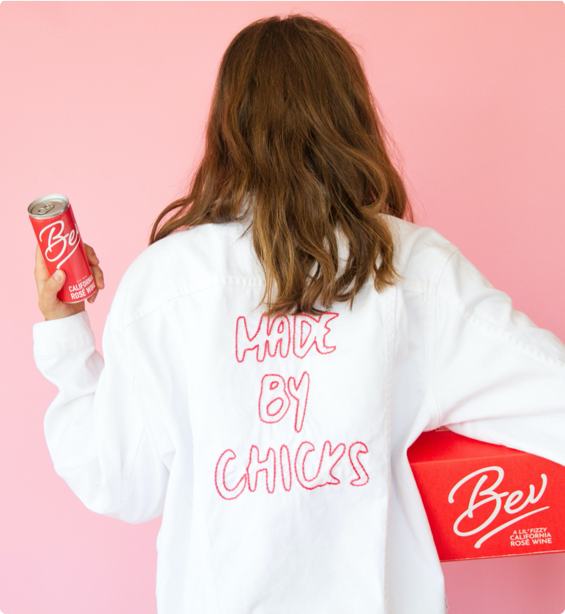Sip On This: Why Bev is Investing in Customer Service and Mobile Marketing to Upend the Alcohol Industry

Listen in your favorite podcast app
Apple Podcasts / Google Podcasts / Spotify
Entrepreneurs are, by nature, risk-takers. But most would still think it’s crazy to invest your entire life savings on 300 gallons of rosé. Nevertheless, that’s the true story of how Alix Peabody started her company, Bev.
Sold online and in-store, Bev is a made-by-chick alcohol company famous for its canned rosé. Alix says that Bev’s secret to success is built on some key pillars, the most important of which might surprise you: customer service. On this episode of Up Next in Commerce, Alix explains why ecommerce brands should be investing heavily into their customer service operations. Plus, she reveals how she is capitalizing on the huge percentage of buyers that come from mobile.
Main Takeaways:
- Integrate Customer Service into the Company Culture From the Start: Too many companies gloss over the importance of having a good customer service operation that is integrated into the company as a whole. There is a real importance to this team, and it is critical to understand how influential and impactful they are when it comes to new product development or flagging recurring issues that could turn into beasts down the road.
- The Influence on Mobile: A staggering percentage of ecommerce orders are taking place on mobile (I bet you can’t guess exactly how high this percentage is for Bev!), which makes investing in a frictionless mobile experience a must-do for brands.
For an in-depth look at this episode, check out the full transcript below. Quotes have been edited for clarity and length.
Key Quotes:
“I knew nothing about booze, I knew nothing about the industry. I really wanted to make a voice for women, and good dudes, in a space where there just really hasn’t been much out there. So, I tried to figure out how I was going to sell this product?”
“Beverage is such an interesting category because people don’t realize how emotional it is. But brands really drive a lot of the purchasing power in terms of what people choose to consume, because it says a lot about who you are. Think about Monster versus Red Bull, Fiji versus Smartwater. It’s more emotional than people realize off the bat.”
“From an emotional perspective, it’s been important for us to really make sure that who we are and why we are is front and center and easily accessible [on the website]…We’ve seen that our repeat purchase rates are really strong because people become such advocates of not just the product but the brand.”
“My favorite compliment is, ‘Wow, it’s actually delicious.’ I love that because it means people don’t expect it to taste how it does out of the can.”
“The way that we really try to attack marketing is making sure that the messages that we’re sending aren’t too many. They’re very focused on what we want to do. So, for us, it’s really that we’re a made-by-chicks, zero-sugar product and our mission is to break the glass. That’s what we really try to hone in on.”
“One of the things that really surprised me at the very beginning of takeoff is customer service and how critical that is. You can turn somebody from a ‘Karen,’ into an evangelist with a strong customer service team. I think people underestimate how revenue generating that can be.”
“[Customer service] is the voice of the brand. They’re the literal person that people are communicating with. So, we actually have a policy where anyone who starts especially on the marketing team has to do two weeks of customer service, they have to understand who our customers are, how we talk to them, how we interact. It’s critically important. I think that team has to be so well-trained on culture and brand voice and mission and making sure that they’re constantly getting better and getting better.”
“The loudest people are the ones that drive conversation a lot of the time. I think brands fail when they try to be everything to everyone. That’s not a brand. That’s just a thing. We are who we are. We care about what we care about. That’s where you’re going to be the difference between a product and a brand that has real lasting power.”
“About 70 to 80% of purchases are made on mobile…. I was really surprised by that, that people are buying on their phones, because they’re seeing it on Instagram and TikTok and all of these different outlets, where they’re sitting on their phone and they’re clicking through. So, making sure that process is seamless has been really important.”
“I’m a huge advocate of quality over quantity. So, I would rather have a longer-term partnership with a fewer number of people, where they’re repeating rather than just one huge post from a large scale influencer. We’ve seen bigger ROIs on the smaller people with higher engagement.”
Mentions:
- Never Split the Difference
- Superhuman
- The Crown
- The Queen’s Gambit
- Bombas Episode
- Yellow Leaf Hammocks Episode
- Serena Kerrigan
Bio:
Alix Peabody is the Founder & CEO of Bev. Alix started Bev after cashing out her 401K and investing all of the money in 300 gallons of rosé. Today, Bev is a multimillion-dollar company that is distributed online and in stores.
Learn more and place your Bev order today.
Image: Bev